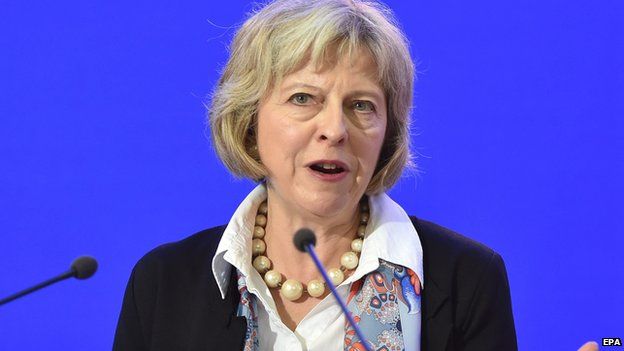Theresa May: Free EU movement 'for those with jobs'
- Published

EU free movement should mean the "freedom to move to a job" - not to look for work or benefits - Home Secretary Theresa May has said.
This would be a return to the "original principle" of free movement in the EU, she wrote in the Sunday Times.
Mrs May also said this summer's migrant crisis had been "exacerbated by the European system of no borders".
Meanwhile, Downing Street has confirmed David Cameron will travel to Spain and Portugal to discuss EU reform.
He will meet Portuguese Prime Minister Pedro Passos Coelho in Lisbon and Spanish PM Mariano Rajoy in Madrid on Friday, a spokesman said.
'Simply unsustainable'
Mrs May's comments come days after official statistics showed net migration to the UK is at an all-time high, reaching 330,000 in the year to March.
The figure - the difference between the number entering the country and those leaving - is more than three times higher than the government's target.
Mrs May said the figure was "far too high" and "simply unsustainable".
The "biggest single factor" stopping the government achieving its aim of reducing net migration to the tens of thousands was net migration from the EU, she wrote.
However, CBI director general John Cridland said the "vast majority" of people coming to the UK did so to work and were a "benefit to our economy".
"Our hospitals and care homes couldn't function without overseas workers; building sites that we need to deliver more homes and big infrastructure projects would also stall," he said.
But Mr Cridland said he would have concerns if EU workers were hired for jobs before arriving in the UK, as it would cause "issues" for companies unable to advertise across Europe.
Labour leadership contender Andy Burnham said EU countries might be willing to offer the government concessions if the UK did more to ease the current migrant crisis across Europe by taking more refugees.
Free movement of workers is a "fundamental principle" of the EU, and as a member nation the UK cannot stop EU nationals arriving to seek work.
Non-workers have the right to stay for up to three months, and pensioners can live in any EU country provided they have health insurance and sufficient income to live without support.
EU migration is one of the issues Mr Cameron aims to address in his renegotiation of Britain's place in the EU - which he has pledged to do before the in-out referendum due to be held by the end of 2017.
'Rigorous control'
He has not revealed full details of what he hopes to achieve, but he is not expected to demand an end to free movement - viewed as a key principle and a "red line" by some EU leaders.
Instead he is likely to focus on restricting access to benefits.
Mrs May also said "rigorous control" of the UK's student migration system had helped reduce the number of further education visa applications, while the number studying at top universities had gone up.
The figures showed "long-term immigration for study" rose by 12,000 to 188,000 in the year to March.
Mrs May said the figures "clearly show that too many students are not here temporarily".
She said the government must "break the link between short-term study and permanent settlement" in the UK.
'Wake-up call'
Referring to the migrant crisis, Mrs May wrote: "The events of the summer have shown that the most tragic consequences of a broken European migration system have been borne by those at risk of exploitation.
"And the greatest beneficiaries have been the callous gangs who sell false dreams and trade on the free borders within the EU."
More than 300,000 migrants have risked their lives trying to cross the Mediterranean to Europe so far this year, according to the UN.
Mrs May said the crisis was a "wake-up call for the EU".
"Its leaders must consider the consequences of uncontrolled migration - on wages, jobs and social cohesion of the destination nations; on the economies and societies of the rest; and on the lives and welfare of those who seek to come here," she said.
Meanwhile, Germany, France and the UK have called for an urgent meeting of EU interior and justice ministers to "find concrete steps" to tackle the migration crisis.
- Published27 August 2015
- Published27 August 2015
- Published21 May 2015
- Published3 March 2016